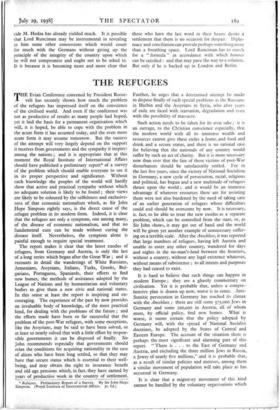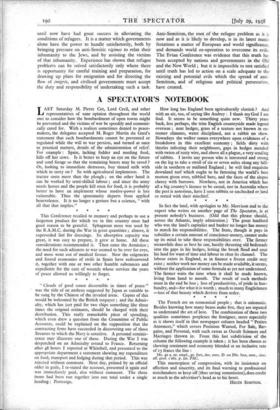THE REFUGEES
THE Evian Conference convened by President Roose- velt has recently shown how much the problem of the refugees has impressed itself on the conscience of the civilised world. And even if the conference was not as productive of results as many people had hoped, yet it laid the basis for a permanent organisation which will, it is hoped, be able to cope with the problem in the acute form it has assumed today, and the even more acute form it may assume tomorrow. But the success of the attempt will very largely depend on the support it receives from governments and the sympathy it inspires among the nations ; and it is appropriate that at this moment the Royal Institute of International Affairs should have published a preliminary report* of a survey of the problem which should enable everyone to see it in its proper perspective and significance. Without such . knowledge the peoples of the world will hardly show that active and practical sympathy without which no adequate solution is likely to be found ; their views are likely to be coloured by the selfishness and exclusive- ness; of, that economic nationalism which, as Sir John Hope Simpson rightly says, is the direct cause of the refugee problem in its modern form. Indeed, it is clear that the refugees are only a symptom, one among many, of the disease of economic nationalism, and that no fundamental cure can be made without curing the disease itself. Nevertheless, the symptom alone is painful enough to require special treatment.
The report makes it clear that the latest exodus of refugees, from Germany and Austria, is only the last of a long series which began after the Great War ; and it recounts in detail the wanderings of White Russians, Armenians, Assyrians, Italians, Turks, Greeks, Bul- garians, Portuguese, Spaniards, their efforts to find new homes, the methods of assistance adopted by the League of Nations and by humanitarian and voluntary bodies to give them a new civic and national status. In this sense at least the report is inspiring and en- couraging. The experience of the past by now provides an invaluable body of knowledge, of the most practical kind, for dealing with the problems of the future ; and the efforts made have been so far successful that the problem of the post-War refugees, with some exceptions, like the Assyrians, may be said to have been solved, or at least so nearly solved that with a little effort by respon- sible governments it can be disposed of finally. Sir John recommends especially that governments should relax the conditions for acquiring nationality in the case of aliens who have been, long settled, so that they may have that secure status which is essential to their well- being, and may obtain the right to insurance benefit and old age. pensions which, in fact, they have earned by years of productive work in the country of settlement.
* Refugees. _ Preliminary Report of a Survey. By Sirjohni-lop: Simpson. (Royal Institute of International Affairs. 3s. 6d.) Further, he urges that a determined attempt be made to dispose finally of such special problems as the Russians in Harbin and the Assyrians in Syria, who after years of exile are faced with starvation, degradation and even with the possibility of massacre.
Such action needs to be taken for its own sake ; it is an outrage, to the Christian conscience especially, that the modern world with all its immense wealth and resources cannot give these exiles a home, and food and drink, and a secure status, and there is no rational case for believing that the nationals of any country would suffer by such an act of charity. But it is more necessary now than ever that the fate of these victims of post-War disturbances should be satisfactorily settled. For in the last five years, since the victory of National Socialism in Germany, a new cycle of persecution, racial, religious and political, has begun and a new multitude of refugees thrust upon the world ; and it would be an immense advantage if whatever resources there are for assisting them were not also burdened by the need of taking care of an earlier generation of refugees whose difficulties could and should be overcome by now. It is necessary, fact, to be able to treat the new exodus as a separate problem, which can be controlled from the start, or, as Sir John shows, it may get out of hand and the world will be given yet another example of unnecessary suffer- ing on a terrible scale. After the Anschluss, it was reported that large numbers of refugees, having left Austria and unable to enter any other country, wandered for days and nights in the no-man's-land between the frontiers, without a country, without any legal existence whatever, without means of subsistence ; to all intents and purposes they had ceased to exist.
It is hard to believe that such things can happen in modern Europe ; they are a ghastly commentary on civilisation. Yet it is probable that, unless a compre- . hensive plan is drawn up now, worse is to come. Anti- Semitic persecution in Germany has reached its climax with the Anschluss ; there are still some 375,000 Jews in Germany and some 200,000 in Austria, all of whom must, by official policy, find new homes. What is worse, it seems certain that the policy adopted by Germany will, with the spread of National Socialist doctrines, be adopted by the States of Central and Eastern Europe. The account of the situation there is perhaps the most significant and alarming part of this report. " There is . . . to the East of Germany and Austria, and excluding the three million Jews in Russia, a Jewry of nearly five millions," and it is probable that, as a result of similar policies and motives, among them a similar movement of population will take place as has occurred in Germany.
It is clear that a migratory movement of this kind cannot be handled by the voluntary organisations which until now have had great success in alleviating the conditions of refugees. It is a matter which governments alone have the power to handle satisfactorily, both by bringing pressure on anti-Semitic regimes to relax their inhumanity to the Jews, and by assisting the victims of that inhumanity. Experience has shown that refugee problems can be solved satisfactorily only where there is opportunity for careful training and preparation, for drawing up plans for emigration and for directing the flow of emigres, and civilised governments must accept the duty and responsibility of undertaking such a task. Anti-Semitism, the root of the refugee problem as it now and as it is likely to develop, is in its latest mani- festations a matter of European and world significance. and demands world co-operation to overcome its evils. The Evian Conference was evidence that this truth ha, been accepted by nations and governments in the Old and the New World ; but it is impossible to rest satisfied until truth has led to action on a scale adequate to the existing and potential evils which the spread of anti- Semitism, and of religious and political persecution. have created.



































 Previous page
Previous page